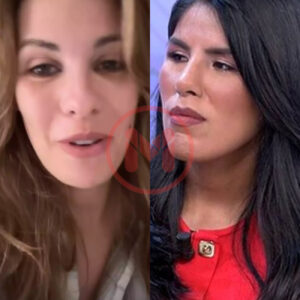Bertín Osborne Confirmed Terrible News to Gabriela Guillén About Her Baby: A Dramatic Interview with Santi Acosta
Gabriela Guillén’s recent interview with Santi Acosta on Telecinco has stirred the media, bringing intense attention to a dark chapter of her life. The interview, broadcast on Friday, revealed deeply troubling details about Guillén’s childhood, a narrative that struck a chord due to her relationship with Bertín Osborne, the well-known Spanish television personality. The shocking revelations have sparked significant reactions from both Bertín and his family, shedding light on complex emotions surrounding this public story.
A Heartbreaking Childhood
Gabriela Guillén’s emotional account of her traumatic childhood has raised serious concerns and elicited sympathy from viewers. During the interview, Guillén shared that she had suffered unimaginable abuse, recalling her experiences as a young girl. “I was an abused, unhappy, and isolated child,” she began. “I felt like a prisoner because I was too scared to tell my family about what was happening.” At just eight years old, Guillén described being subjected to abuse by her uncle, who was the brother of her mother’s new husband. He convinced her that their actions were just a “game” and urged her not to tell anyone

The pain of living with the person who abused her, unable to escape or speak out, left lasting scars on Guillén. Her account also detailed how this abuse severely impacted her emotional and psychological development. “It was terrifying to be alone and not be able to scream to the world, afraid that no one would understand me,” she added.
This traumatic chapter of Guillén’s life has continued to haunt her, especially when it comes to her personal relationships. She mentioned that her first romantic relationship was marred by intense feelings of rejection and disgust, a direct consequence of the abuse she endured. Moreover, her connection to Paraguay, where these events took place, remains strained, as she expressed a deep aversion to returning to the country.
Struggles with Mental Health
Guillén also opened up about the mental health struggles she faced in the aftermath of her childhood trauma. She revealed that she had attempted suicide on three separate occasions, one of which involved taking pills. “It was the only way to stop my mind, to calm my pain,” she said. However, despite these dark times, Guillén emphasized that her son had been her salvation. “My son saved my life,” she declared. “He has been the best thing that has ever happened to me, and I will never regret choosing to have him.”
The story of Guillén’s abuse and subsequent emotional struggles highlights the lasting effects of trauma and the difficult journey of healing. Her bravery in speaking out about her past has earned her sympathy and admiration, but the interview has also sparked controversy.
Bertín Osborne’s Role in the Story
While Guillén’s revelations were personal and harrowing, the involvement of Bertín Osborne has added a layer of complexity to the situation. Guillén’s relationship with Osborne, who is the father of her youngest child, has been fraught with tension, particularly after their separation. During the interview, Guillén confirmed that her current relationship with Bertín is “nonexistent.” She claimed that while she could reach out to him if necessary, she no longer has any desire to do so, especially in light of recent events.
“His son is growing up without him,” Guillén remarked, expressing sadness over Bertín’s absence in their child’s life. “Bertín has been both a turning point and a source of pain in my life. He made mistakes, but he has realized them. Still, the damage is done.”
Guillén also revealed that Bertín has never met their child, which has understandably hurt her. “He has the same smile as his father,” she said, referring to their son. “His mischievousness is identical.”
Public and Family Reactions
The timing of Guillén’s interview, coming just days after the birth of Bertín Osborne’s child with his current partner, has prompted mixed reactions. While many have shown support for Guillén, others have criticized her for bringing up sensitive topics related to Bertín. Media outlets, particularly Telecinco, were quick to associate her traumatic story with Bertín’s name, further complicating an already delicate situation. Some argue that without her connection to Bertín, Guillén’s story may not have garnered the same level of media attention or financial compensation.
Bertín’s family, including his daughter Eugenia, has publicly commented on the situation. Eugenia, speaking about Guillén’s interview, acknowledged the difficulty of the revelations but also expressed empathy. “What she has confessed is incredibly brave,” Eugenia said. “I hope she has worked through her issues and overcome them, because it’s not easy. It’s something that happens more often than we realize.”
Despite this show of understanding, Eugenia stopped short of commenting on her father’s involvement, further distancing herself from the controversy.
Tensions and the Media’s Role
The involvement of Bertín’s family in the media storm has sparked tensions. Guillén hinted during the interview that her relationship with Bertín had been strained at times, particularly due to interference from his daughters, who reportedly pressured him to seek paternity tests. These revelations only add to the ongoing drama surrounding the Osborne family and their complex dynamics.
While Guillén’s story is undeniably tragic, the way the media has handled it—especially in connection to Bertín Osborne—has raised questions. Some viewers feel that the emphasis on Bertín’s name detracts from the seriousness of Guillén’s experience, turning it into a sensationalized spectacle rather than a deeply personal account of trauma and survival.
What’s Next?
Guillén has promised to share more details about her journey in a follow-up interview next Friday. It remains to be seen whether the second part of her story will continue to focus on her troubled relationship with Bertín Osborne or delve deeper into her personal healing process.
In the meantime, the public and the media continue to debate the ethics of broadcasting such intimate, painful experiences. While many viewers empathize with Guillén’s situation, the involvement of Bertín Osborne in her story complicates the narrative, turning what could have been a healing moment into a larger, more controversial spectacle.
Regardless of the media attention, Gabriela Guillén’s courage in sharing her story cannot be denied. Her journey is a powerful reminder of the long-lasting effects of abuse and the importance of speaking out—no matter the personal or public cost.
News
(VIDEO) *GRAVE BOMBAZO DENUNCIA* ¡ISA PANTOJA CONFIESA BOMBA y AMENAZA a ISABEL PANTOJA y AGUSTÍN PANTOJA!
Grave Bombazo Denuncia: Isa Pantoja Confiesa y Amenaza a Isabel Pantoja y Agustín Pantoja La familia Pantoja, conocida por su vinculación al mundo de la música, el éxito y las controversias mediáticas, vuelve a estar en el ojo del huracán….
(VIDEO) ALEJANDRA RUBIO ACOSADA POR TERELU! PIERDE LA CUSTODIA DE SU HIJA Y ES OBLIGADA A DÁRSELA
Conflicto Familiar en el Clan Campos: Terelu y Alejandra Rubio Frente a una Disputa Mediática La familia Campos vuelve a ser el centro de atención, pero esta vez no por alguna celebración o logro profesional. La relación entre Terelu Campos…
(VIDEO) BRUTAL BRONCA DE KIKO MATAMOROS CONTRA MARÍA PATIÑO EN NI QUE FUÉRAMOS POR CRISTINA PEDROCHE
Bronca entre Kiko Matamoros y María Patiño en Ni que fuéramos por Cristina Pedroche La tensión en el mundo del espectáculo siempre está presente, y uno de los momentos más intensos de la televisión española ocurrió en el programa Ni…
(VIDEO) BÁRBARA REY IRRUMPE EN NI QUE FUÉRAMOS Y MARÍA PATIÑO ESTALLA A GRITOS CONTRA ELLA, POR ÁNGEL CRISTO
María Patiño y Bárbara Rey: Un Conflicto Televisivo Que Enfrenta Emociones Fuertes La reciente confrontación entre María Patiño y Bárbara Rey ha dejado a todos los espectadores boquiabiertos. Un conflicto que no solo involucra tensiones entre dos figuras del mundo…
JESSICA BUENO HABLA CLARO: EL LADO MÁS OSCURO DE LOS PANTOJA Y SU APOYO A ISA | m
Jessica Bueno Habla Claro: El Lado Más Oscuro de los Pantoja y Su Apoyo a Isa Introducción Jessica Bueno ha vuelto a ser noticia con unas declaraciones que no han dejado a nadie indiferente. La modelo sevillana ha hablado con…
(VIDEO) FILTRAN VÍDEO ÍNTlM0 DE ASRAF D3SNUD0 Y SE LO OCULTA A ISA PANTOJA
Introducción En las últimas horas, el mundo de la televisión y la farándula española se ha visto sacudido por la filtración de un video íntimo de Asraf Beno, el conocido modelo y participante de varios programas de telerrealidad. Las imágenes,…
End of content
No more pages to load











